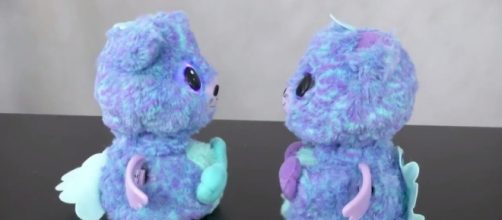Towards the Holiday season year, toy manufacturer Spin Master gambled on a high-concept variation of a particular genre of toy, the artificial pet. Combining the defining elements of two famous artificial pets of past decades – the Furby doll and the Tamagotchi electronic game – they created Hatchimals, interactive toy critters that literally hatch from egg-shaped cases and respond to human touch and limited verbal cues. Despite complaints about bugs or allegations of bad-language learning, Spin Master made enough of a killing on the Hatchimals that they even expanded on the line.
As the Holidays come again this year, the developers are ready with a brand new take on their new cash cow. What is better than a Hatchimal? What about two?
Two pets in one
If parents thought the Hatchimal buying frenzy from late 2016 to early 2017 had been trying enough, the 2017 Holidays will probably have them reconsider. Spin Master is all set to debut “Hatchimals Surprise,” twin Hatchimals from a single egg-case. This iteration of the toy-line will also introduce some new “species” of the cute furry interactive pets, adding to the cartoony birds and little dragons that are already available.
The Hatchimals Surprise pets also mirror real twin babies in that they could be identical or fraternal.
Grown-ups may not quite get why this next step in the toy line's evolution seems simply to stuff two of them in one egg, and their children will simply be of a mind that the more toys, the merrier. But the nifty feature in this new batch of Hatchimals by Spin Master, is that the artificial pets can not only interact with their owners but with each other.
Cute twins
Once hatched, the Hatchimals Surprise twins are said to be able to react to various stimuli thanks to internal sensors. An example of their expanded interactivity can be demonstrated in making one of the pair sing by touching its nose, causing its twin to react by making dancing motions. The Surprise twins also vocalize affection to each other (in mostly Hatchimal-speak) when put face to face, and make upset sounds if they are moved apart for a certain time limit.
Like before, these artificial pets can parrot back spoken words by their keepers.
Parents might remember how this feature from the first batch of toys almost landed Spin Master in trouble for having their artificial pets being “taught” naughty language that they might repeat at inopportune times. Another common problem of the product line has been the distinct possibility that a Hatchimal egg might fail to hatch. Complaints about such problems grew so big in the debut of the first toys that the company was forced to increase its customer call lines.
The original artificial pets by Spin Master still sold bundles when they first came out, earning a respectable revenue of $80 million for the company despite their design bugs.
The new Hatchimals Surprise series is priced at $70 per egg-case (with twins inside), and new creature species as stated earlier. They hit US stores this coming Friday, October 6. Time will tell if the new generation will be spared the chaotic release of its predecessor.


